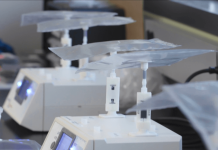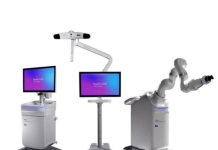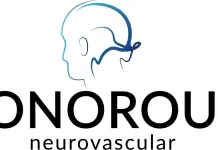Ultromics’ EchoGo Amyloidosis, clinical AI for echocardiography with the potential to revolutionise early detection of Cardiac Amyloidosis according to the company, has received US Food and Drug Administration (FDA) clearance.
Ultomics says this milestone marks EchoGo Amyloidosis as the first device enrolled in the FDA’s Total Product Lifecycle Advisory Program (TAP) to achieve marketing authorisation. The device was among 15 breakthrough cardiovascular devices, to participate in the initial pilot launch phase of the FDA Total Product Lifecycle Advisory Program (TAP) which has since expanded with 55 companies currently enrolled.
Related: LifeSignals gains FDA approval for UbiqVue wearable biosensor
This clearance makes EchoGo Amyloidosis the first commercially available software-only medical device to facilitate detection of Cardiac Amyloidosis using echocardiography. Requiring a single routinely acquired echocardiographic clip, EchoGo Amyloidosis needs substantially less clinical information to facilitate detection of the disease compared to current approaches.
Ultromics, a spin-out company from the University of Oxford (UK), has expanded its portfolio of FDA-cleared, AI-based Echo diagnostics to include EchoGo Amyloidosis.
This development, in collaboration with Janssen Biotech, Inc., a Johnson & Johnson Company, and with support from Pfizer, motivated by their continued commitment to expediting the suspicion, diagnosis and clinical outcomes of Light Chain and ATTR Cardiac Amyloidosis, respectively. Janssen supported the development of the device, while Pfizer supported expediting the performance testing and validation ahead of the regulatory submission.
Ross Upton, PhD, CEO and Founder of Ultromics said: “Echocardiography is a powerful tool for evaluating cardiac structure and function and is central to the detection and monitoring of disease. However, there are some diseases that are very challenging for even the most expert clinician to detect on an echocardiogram. Requiring only a single apical 4 chamber image, EchoGo Amyloidosis identifies Cardiac Amyloidosis, and will help drive earlier access to appropriate treatment and care for patients with this underdiagnosed disease.”
The ability to automatically detect and flag potential Cardiac Amyloidosis with limited clinical information has important practical ramifications, particularly for screening, in clinical centres without the time, resource, or expertise to identify Cardiac Amyloidosis from the echocardiogram, which often has an unspecific presentation on the imaging.
Prof. Sanjiv J. Shah, MD, Northwestern University said: “Improving the detection of Cardiac Amyloidosis is vital as early detection provides the greatest therapeutic benefit for patients. Novel AI-based diagnostic tools such as EchoGo Amyloidosis from Ultromics should help facilitate disease identification, particularly in clinics and hospitals restricted by expertise and resource. With more therapies becoming available, the FDA approval of EchoGo Amyloidosis is timely.”
Cardiac Amyloidosis is an infiltrative cardiomyopathy in which abnormal precursor proteins aggregate to form amyloid fibrils that deposit within the myocardial extracellular matrix, resulting in a restrictive cardiomyopathy. The two primary precursor proteins that form the predominant subtypes of Cardiac Amyloidosis in the United States of America are transthyretin (ATTR) and immunoglobulin light chains (AL).
Both ATTR and AL Cardiac Amyloidosis are systemic diseases whereby Amyloidosis is not only isolated to the heart. Indeed, Amyloidosis can affect the gastrointestinal, visual, renal, neural, cardiac, and musculoskeletal systems, often presenting with non-specific symptoms that make it difficult to detect.
The hallmarks of the cardiac manifestation are generally considered to be consistent between AL and ATTR subtypes, with diastolic dysfunction, left ventricular thickening of the myocardium, atrial fibrillation, abnormal longitudinal strain, apical sparing, atrial enlargement and pericardial effusion all being common.
The consequence of the disease is severe, and patients often suffer with increasingly debilitating symptoms and diminishing quality of life, owing to a poor understanding of how to manage their heart failure and frequent, high burden symptoms.
In ATTR Cardiac Amyloidosis, patients diagnosed with end-stage (stage III) versus early-stage (stage I) disease have a median survival time of approximately 2 years compared to about 5.8 years. Likewise, patients diagnosed with end-stage (stage IV) versus early-stage (stage I) AL Cardiac Amyloidosis have median survival time of 0.4 years compared to 4.6 years.
Thus, early diagnosis of Cardiac Amyloidosis can dramatically reduce the debilitating nature of the disease and may extend survival even further with access to appropriate therapy.
Due to the non-specific presentation and frequent coexistence with other cardiac conditions, Cardiac Amyloidosis is often missed at initial clinical visits. Patients with heart failure with preserved ejection fraction (HFpEF) are a group particularly at risk for Cardiac Amyloidosis, but Cardiac Amyloidosis is commonly overlooked in this population, with up to two-thirds of cases missed.
Furthermore, HFpEF itself is frequently underdiagnosed, suggesting that the absolute number of patients with undetected Cardiac Amyloidosis may be even higher. This diagnostic delay has significant consequences, leading to progressively worsening symptoms, poor survival, repeated hospitalisations, and numerous medical consultations.
Despite the need for accurate identification, most patients referred for diagnostic testing do not have Cardiac Amyloidosis, indicating that both confirming and excluding Cardiac Amyloidosis remains a challenge in clinical practice.
Compounding this issue, current diagnostic tools, including traditional echocardiography, often fall short by not reliably connecting findings to specific clinical investigations for Cardiac Amyloidosis. Importantly, echocardiography faces challenges due to variability in image acquisition, measurement, and interpretation across all phases of use.
EchoGo Amyloidosis is a cutting-edge AI-powered tool designed to enhance the detection and management of Cardiac Amyloidosis, specifically tailored to address common diagnostic challenges in this underdiagnosed condition. Leveraging standard echocardiogram images, it enables clinicians to identify potential cases with enhanced accuracy and efficiency, requiring only a single apical 4-chamber echo video clip.
EchoGo Amyloidosis is part of Ultromics’ EchoGo platform, complementing the EchoGo Heart Failure device to provide a robust solution for diagnosing heart failure and its underlying causes. Together, these tools enhance diagnostic accuracy, enable systematic screening, and support timely access to potentially life-saving therapies.
The platform is further supported by reimbursement pathways: outpatient settings are covered under Category III CPT Code 0932T, assigned to APC 5743 effective January 1, 2025. For inpatient use, it continues to benefit from coverage through NTAP XXE2X19.
Ultromics’ medical devices are software-only, manufactured internally, that use an image from a routinely acquired echocardiogram taken from a patient which is then used to report on the likelihood of the specified disease, in this case, Cardiac Amyloidosis.
The device uses artificial intelligence to produce a classification which is intended to inform an interpreting clinician of the likelihood of the disease and can be automatically returned from the Ultromics’ cloud-based architecture to the clinical systems and appended to the patient records.
Integration at the clinical site involves utilizing existing hardware, with no requirement for additional equipment and the device operates as a Software-as-a-Service (SaaS) model making the solution highly scalable and able to be deployed rapidly on a large scale.




